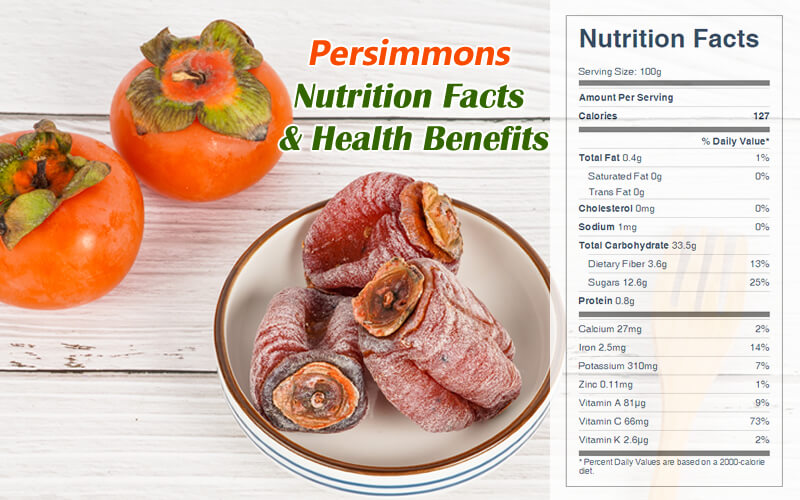Persimmons Nutrition Facts & Health Benefits
Persimmon is a sweet fruit that looks like a large orange tomato. They are among the most commonly eaten fruits on earth. Persimmons are a good source of antioxidants and carotenes, vitamins, and fiber. Here are the nutritional benefits of persimmons.
The persimmon is grown throughout Asia and California. The Japanese persimmon is larger than the American version. It contains many of the nutrients of its American cousin but has less vitamin C and calcium per gram.

Nutritional Composition of American Persimmon
One medium raw American persimmon provides 32 calories, 8.4 g carbohydrate, 0.2 g protein, 0.1 g fat, 1.6 g dietary fiber, 17 mg vitamin C, 78 mg potassium, 7 mg calcium, and 7 mg phosphorus.
Nutritional Composition of Japanese Persimmon
One medium raw Japanese persimmon provides 118 calories, 31.2 g carbohydrate, 1 g protein, 0.03 g fat, 6 g dietary fiber, 12.6 mg vitamin C, 270 mg potassium, 13 mg calcium, and 29 mg phosphorus.
Raw Persimmons Nutrition Facts Label
Health Benefits of Persimmons
Persimmons contain a significant number of bioactive compounds, including tannins, carotenoids, phenolic compounds, proanthocyanidins, and catechins.
Astringent persimmons such as the Hachiya are high in tannins, which can serve as antioxidants but also render unripe fruit inedible. The non-astringent varieties, such as the Fuyu, contain fewer tannins and lose them earlier in the ripening process, so these pears can be consumed either while firm or soft.
Persimmons' astringent flavor comes in part from the tannins they contain, which break down as the fruit ripens until practically none are left. Persimmons are a good source of betacarotene, vitamin C, calcium, magnesium, phosphorus, and potassium.
Persimmons are rich in carotenoids, especially beta-carotene that can be converted into beta-cryptoxanthin. Both these components possess substantial biological activities. Of these, tannins and carotenoids reduce free radicals, thus having an effect on reducing heart disease and preventing cancer. And the polyphenols and anthocyanins also reduce DNA damage from outside environmental factors.
Persimmons have higher levels of dietary fiber and some dietary minerals than apples. According to one study, persimmons have higher concentrations of phenolic compounds and fiber than apples. The pulp contains 6 grams of fiber, and the peel contains even more—when combined, they give you three times the fiber as apples! In addition, they contained more of the major phenolics that have antioxidant activity than apples.
The compounds in persimmons may combat heart disease, cholesterol, and stroke. When compared to an apple, a persimmon a day did more to reduce heart disease than an apple. And remember all the other benefits of fiber as they relate to improving gut health and feeding your microflora? Persimmons contain a significant amount of fiber: just one fruit contains 6 grams of fiber, or 20 percent of an adult’s daily requirement.
In traditional Chinese medicine, raw persimmons are used to treat constipation. Cooked persimmons are used to treat diarrhea.
These small orange-colored fruits have many nicknames, such as "fruit of the gods" and "nature’s candy." A key fact you may not know is that the entire fruit can be eaten, including the skin! That’s important to remember as there are many benefits you would miss out on otherwise.
Health Risk
Unripened persimmons contain the soluble tannin shibuol, which, upon contact with a weak acid, polymerizes in the stomach and forms a gluey coagulum. The tannin reacts with the acid in the stomach to form a kind of glue that can attach to other stomach matter known as a bezoar. These phytobezoars are often very hard. More than 85% of phytobezoars are caused by ingestion of unripened persimmons.
Storage
Choose persimmons that have good, bright color and whole, shiny skins with no cracks or leaks.
Unripe persimmons can be hastened by placing them in a paper bag along with some ripening bananas.
Persimmons are best when harvested after a frost. Store them in the refrigerator. Take advantage of the fact that persimmons can be ripened by freezing: freeze them overnight, then thaw them for eating. This "ripening" also converts the tannins into a more edible form.
Persimmons can go from ripe to overripe in a very short period of time, so enjoy ripe persimmons within a day or two. Fully ripe persimmons will feel thin-skinned and full of juice. Handle them carefully.
Light-colored persimmons taste sweet only when mushy, but darker persimmons can be eaten before becoming overly soft. Enjoy persimmons by themselves, added to salads, or used in jams, puddings, and pies.